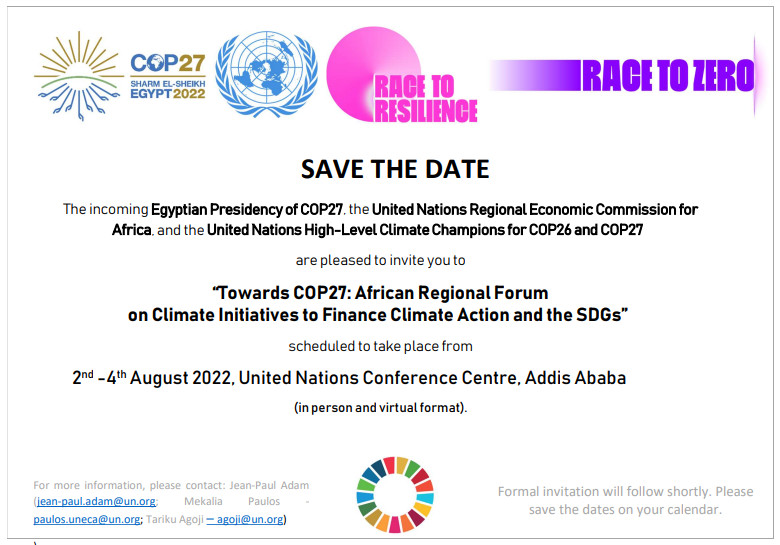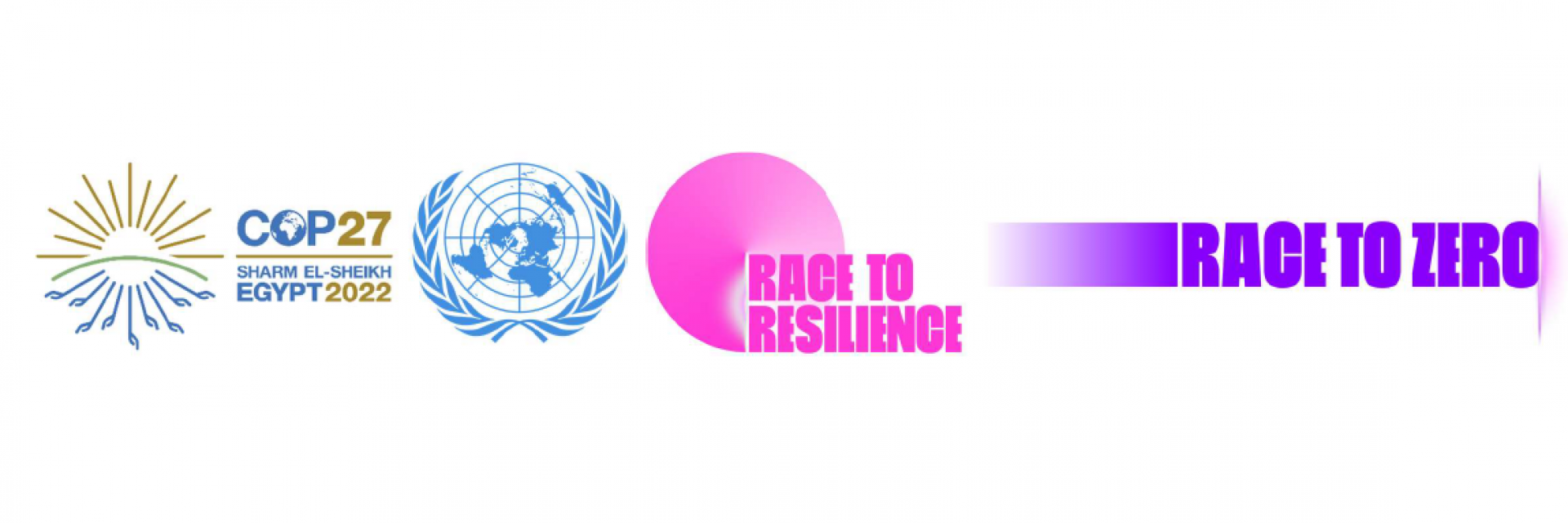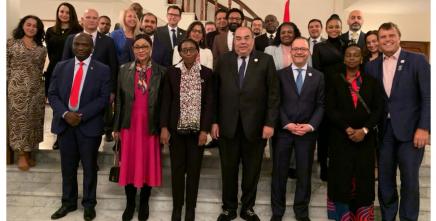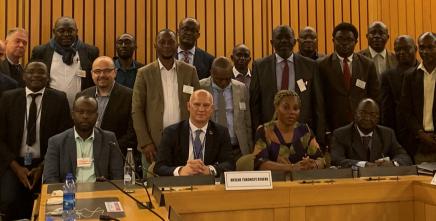
The African Roundtable will deliberate on catalytic mechanisms to mobilise climate finance investments and crowd-in the private sector towards building climate resilience as well as advancing Agenda 2063 & the 2030 Agenda. It is imperative that all available tools for green growth pathways be leveraged to increase resilience and sustainability. Notably, there is need to mobilize new financial resources in the face of multiple crises, including through amplifying the role of private capital markets in the development financing landscape of the continent by supplementing scarce concessional financing. Crucially, Africa will require investments of over $3 trillion in mitigation and adaptation by 2030 in order to implement its NDCs. This will be contingent upon access to significant, accessible and predictable inflows of conditional finance as well as strengthened domestic resource mobilization efforts. In this vein, Africa will need to considerably improve the efficiency of public expenditures and project investments. Accordingly, the Roundtable will gather key stakeholders from the public and private realm to showcase both the success stories of private sector investments in climate areas and investment-ready climate initiatives transpiring in Member states. As such, the deliberations will focus on channels and means to catalyze and scale up financing around concrete initiatives, investment opportunities and policy measures in climate action areas outlined below: Just transition finance - Building resilience and a green transition for African requires significant financial investments. A successful green transition will be built on new models of resource mobilisation with a focus on how these resources are channelled into the most critical sectors. This will necessitate a reset of some of the development architecture available to African countries. Moreover, a deepening of Africa’s internal capital markets and increasing the tools available for investing in green sectors are imperative. The overwhelming majority of the global deficit in electricity access is in Africa, hence investing in energy will be pivotal for stimulating all sectors of the economy. Further, the continent’s oil and gas exporting nations are also at risk from significant long-term revenue and job losses, and it is essential that a just energy transition is defined with the role of transition energy sources such as natural gas clearly mapped out with a view that such investments ought to leverage the switch to clean energy technologies. Clearly costed just transition investment plans will be pivotal for galvanizing private investments. Crucially, country platforms for a just energy transition need to be linked directly to identified resources for investment. This session will explore how to leverage institutional investors, private equity managers, development partners and other financing institutions to support African countries in their green transitions; how public finance can leverage private finance; identify key bottlenecks hampering private sector investments and required actions to better promote such investments into renewable energy and grid modernization; and enhance capacity for project transactions and PPP promotion to help mobilize private sector financing for infrastructural development. Further, it will highlight the ambitious International Just Energy Transition Partnership launched to support South Africa’s decarbonisation efforts at COP26 as a model for other country platforms on the continent. Blended finance – Climate Bonds: African countries require fiscal space to finance SDG-linked investments towards sustainable and green recovery pathways, particularly since public finance alone cannot meet development imperatives. Investments from the private sector are well placed to fill in the financing gaps. Blended financing approaches are potentially catalytic as they could ensure that public resources leverage and de-risk private financing to support such development efforts. Yet, private finance mobilization has not increased significantly in Africa of late and continues to face multiple challenges . Public finance mobilizes around $30 billion of private finance annually, with most of the resources destined for middle-income countries where projects are easier to realize. Notably, through the provision of credit guarantees, such as policy-based guarantees, and enhancements needed to lower perceived default risks, blended public and private financing can improve credit ratings. This session aims to deliberate on opportunities to scale and learn from countries that are leveraging investment opportunities for climate action as well as financial institutions and investors acting on climate private capital in Africa to support the development of renewable energy projects. It will also identify projects ready for implementation, scale-up and replication to be showcased at COP27. ECA’s recently launched the Liquidity and Sustainability Facility (LSF) will be highlighted, which has the dual objective of supporting the liquidity of African Sovereigns Eurobonds and incentivizing green and SDG-related investments such as green bonds in the African Continent. Notably, the LSF can incentivize green bond issuances by offering preferred repurchase agreement rates to institutional investors that refinance their positions using African green bonds as collateral . It will also explore ESG criteria, particularly its simplification, to make it more accessible for African countries. Finally, it will seek to look at challenges hindering the upscaling of climate bond issuance from the private sector and measures needed to attenuate such challenges. Debt swaps: Following the COVID19 pandemic and continued macro-economic instability linked to global events, 15 African countries are at risk of external and public debt distress, and 6 already facing debt distress. Despite these challenges, African countries have made significant strides to ensure the transparency of their operations on capital markets as well as provide reliable investment opportunities. As such, debt for climate adaptation swaps are primarily aimed as a tool to generate additional investment and liquidity for climate resilience, rather than a tool for restructuring. This session will focus on identifying a portfolio of investment areas and projects, such as the energy transition, where debt for climate swaps can be deployed, and then engage with countries to develop feasibility studies in collaboration with pertinent partners from the public and private sector. It will also delve into ways of tackling key barriers precluding large scale debt swaps. Nature based Solutions (NbS): Nature-based solutions have been garnering increased attention in recent years, emerging as an integrated approach that can help build climate resilience at relatively low-cost, as countries, companies and investors step up their efforts to cut carbon. They are essentially actions to protect, sustainably manage, and restore natural or modified ecosystems, that address societal challenges effectively and adaptively, simultaneously providing human well-being and biodiversity benefits. They do so in a holistic manner by combining efforts for emission reduction, increased carbon sink potential, cost-effective adaptation and improved resilience. Yet, to fulfil their potential, they require proper support and financing. This session seeks to interrogate the social, ecological and economic effectiveness of nature-based solutions. It will identify potential investment-ready projects, particularly in mangrove restoration, and showcase successful examples of NbS implementation developed in a selection of African countries. Notably, it will feature the Ethiopian Green Legacy Initiative, which seeks to build climate resilience of hydroelectric infrastructure through ecosystem management, supporting local livelihoods and generating employment through bettered management and improving women’s health by reducing exposure to particulate pollution through clean cook-stoves. It will also hone in on opportunities upscale and galvanize private sector investments, as well as deliberate on the practical, financial and governance challenges to upscaling and how to increase bankability, with a view to inform those eager to invest. Carbon credits: Africa can gain substantial resources for investment and gain greater access to liquidity and affordable financing through innovative climate financing by harnessing the continent’s natural capital, tapping into the market for carbon credits which is set to grow exponentially in the context of the implementation phase of the Paris Climate Agreement. Achieving reliable flows of capital associated with carbon credits can be used to leverage investment in key sectors such as agriculture and enhance the value of nature-based solutions. Currently, African countries remain on the periphery of this market development; yet, there is increasing political will to develop such opportunities as Africa possesses substantial natural endowments which are well suited to large scale carbon sequestration. This session will examine the importance of carbon markets in mobilizing private finance for Africa; how a carbon price can raise additional resources to meet Africa’s needs; the development of a harmonised high integrity carbon registry for carbon sequestration in countries of the Congo Basin and development of a regional carbon certification mechanism. It will also underscore country case experiences from the Congo Basin to share lessons and best practices. Risk Insurance: Africa has the opportunity to mitigate residual risk and reduce the impact of loss and damage by transferring at least part of its climate risk to the international market through a risk pooling platform known as The African Risk Capacity Platform. Climate risk insurance provides financial resilience by generating a flow of capital to support societies in recovering from disaster. In the absence of adequate insurance, the burden of paying falls on citizens, governments or aid organisations. When disasters strike, insurance can provide significant financial protection and reduce large scale societal impacts. This session aspired to explore the means to upscale the significant protection already provided through the African Risk Capacity Mechanism and address existing gaps. It will identify synergies and entry-points for climate finance and investments by engaging countries to prioritize programs in the context of their national financing and policy frameworks, including proposals on how low-income countries can acquire more support, whilst also considering those with more developed markets. Moreover, it will also seek to enhance collaboration between public and private stakeholders to improve risk management and transfer across different layers of risk exposure.



